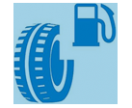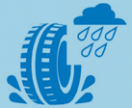Race proven track performance
The AR-1 and NS-2R have been selected for multiple championships as control tyres including:
Nankang Tyre BMW Compact Cup
Nankang Tyre City Car Cup
Civic Challenge
Focus Cup
BMW116i Trophy
Peugeot 206 GTi Cup
MaX5
Classic VW Cup
As well as multiple open tyre series such as 750MC Club Enduro, Time Attack, BMWCCR, CSCC New Millenium
New for 2021 is the SL-1 a full slick for track use only. This has been tried and tested over at the Nurburgring
The CR-S has now fully launched in 2024 and is looking to shake up the 200TW market
For most purposes, racing tyres will benefit from an appropriate ‘scrubbing in’ procedure. This provides the best combination of performance and longevity under race conditions.
There are several difficulties that arise when using racing tyres if they are not scrubbed in prior to use. The most common is “Cold Graining”, where the layer of the tread compound in contact with the track, fails in shear with the layer below. The result is a very visible low frequency, high amplitude rippling effect. This is more common with new tyres particularly when used in wet, damp or greasy conditions.
Nankang Motorsport recommends that a standard scrubbing in procedure be used whenever possible (conditions and regulations allowing). This consists of subjecting the tyres through one gentle heat cycle, gradually loading them up whilst avoiding drifting the car. Set cold air pressure at an adequate psi to handle the weight of the car. On track, gradually increase speed subsequently for a minimum three to four laps, with the first lap at 50%-60% of normal usage, gradually increasing but not to exceed 85% capacity with a cool down lap by the end of the session. This will result in a much-improved tire life and on track performance for future sessions.
If possible, scrub in at least one new set of tyres during free practice and put these aside for the race. In this way you will know that they have been balanced correctly, and have no slow punctures etc. Getting this done early is important as the qualifying session may become wet or be red flagged, which could force the use of new tyres in a race.
It should be noted that there is always going to be a slight performance peak from new tyres, but it will only be possible to take advantage of this if the car is balanced on its tyres. A correctly scrubbed in set of tyres will always give more consistent performance over its lifetime than a set that has been used hard from new, even if it hasn’t grained.

On the top left of the label, this shows 7 classes which range from A (most efficient) to E (least efficient), the grading indicates the tyre's contribution to fuel efficiency and CO2 emissions.

On the top right of the label, this shows 7 classes ranging from A (highest wet grip performance ) to E (lowest wet grip performance). Tyres with excellent grip in wet conditions have shorter breaking distances.

The grading indicates the tyre’s contribution to traffic noise and the environment. The label displays sound waves and corresponding levels ranging from 1 (least noise) to 3 (highest noise).